Audi is rolling out virtual programmable logic controllers at its Böllinger Höfe site with Siemens, Broadcom and Cisco, replacing hardware with cloud-based automation to enhance agility, scalability and environmental efficiency
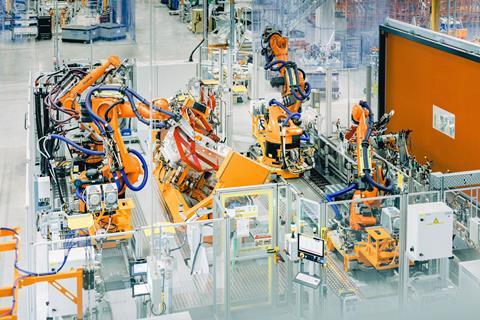
At its Böllinger Höfe facility, Audi is transforming the architecture of automotive manufacturing with a shift that is both radical and subtle. While the production line for the Audi e-tron GT still hums with robotic arms and welding sparks, the machines are now guided not by traditional programmable logic controllers (PLCs) bolted inside industrial cabinets, but by virtual systems hosted in the cloud.
In what it claims is a world first, Audi has implemented a fully virtualised and TÜV-certified programmable logic control system for safety-critical production processes. Developed in partnership with Siemens, Broadcom and Cisco, the new system replaces physical PLCs with cloud-based controllers running on Audi’s Edge Cloud 4 Production (EC4P) platform. This not only removes hardware from the shopfloor but also rewires the very logic that underpins factory automation.
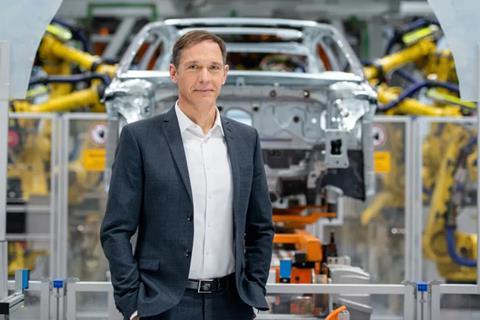
“Controllers truly are the ‘brains’ of machines and factories,” said Cedrik Neike, CEO of Digital Industries and Member of the Managing Board at Siemens AG. “Now we are virtualising these brains and bringing them to the cloud. This accelerates the digital transformation at Audi and increases agility, efficiency, and security in production – for more flexible, future-proof manufacturing. Together, we are taking automotive production to a new level and significantly strengthening competitiveness.”
The initiative marks a crucial step in Audi’s 360factory strategy, a push for data-driven, highly connected manufacturing. “The use of virtual programmable logic controllers in the bodyshop is an important productivity leap in our 360factory strategy for efficient and data-driven manufacturing,” said Gerd Walker, Audi Board Member for Production. “We want to bring the local cloud for production to all plants and leverage advances in digital control systems in the process.”
While EC4P had already been trialled in the final assembly of the Audi e-tron GT, its application in the Böllinger Höfe bodyshop – which also produces Lamborghini models – represents a more complex and safety-critical use case. The virtual PLCs developed with Siemens are certified to handle safety functions, laying the groundwork for full-scale virtualised control in future manufacturing environments.
Reprogramming the production line
Audi is replacing thousands of factory PCs with Edge Cloud 4 Production, a centralised, ultralow-latency virtual control system that could fundamentally change how plants manage robots, AGVs and assembly lines. Piloted at Böllinger Höfe, the system promises faster software deployment, seamless predictive maintenance and scalable use of AI-powered digital twins.
Then, Head of manufacturing engineering (now Global Head) Jörg Spindler, told AMS he sees it as the foundation for virtualised production planning, already applied from Germany to Mexico. As Audi ramps up electric vehicle and battery production, Spindler is reshaping factory cycles, welding techniques and team skills for a faster, smarter, mixed-model future.
Replacing hardware with logic
The shift to virtualisation is more than an upgrade in computing power. It redefines control at the edge of manufacturing. Traditionally, production lines rely on dedicated hardware for PLCs, each managing specific machines and operations. These systems are difficult to update, prone to downtime during reconfiguration, and physically limited in scalability.
With the EC4P and VMware Cloud Foundation from Broadcom, these industrial PCs and control units are virtualised. “Through our work together, we’re setting new standards for precision, customisation, and environmental sustainability,” said Sven Müller, project lead for EC4P at Audi. “EC4P will reduce our hardware footprint, replacing thousands of decentralised industrial PCs with a more efficient, scalable and flexible architecture of local edge servers that unites the cloud and the edge on the shop floor.”
“VCF provides a consistent and scalable way for Audi to operate a distributed edge infrastructure, manage resources more efficiently, and lower operations costs. Ultimately, VCF will help Audi increase factory uptime, agility, and the speed of rolling out new applications and tools across the production line”
- Paul Turner, vice president of products for VMware Cloud Foundation, Broadcom
The benefits span the operational and environmental. Virtual PLCs can be deployed, updated or replaced remotely. If a virtual machine (VM) fails, it can be reset within minutes – no technician required. Software patches no longer depend on shift-change downtimes. Feature rollouts are centralised and near-instantaneous. Infrastructure that once needed extensive cooling and cabling now runs on general-purpose servers, consuming less energy and generating less electronic waste.
A digital foundation for a software-defined factory
The VMware Cloud Foundation platform plays a critical role in standardising the infrastructure. As Paul Turner, vice president of products for VMware Cloud Foundation at Broadcom, explained, “VCF provides a consistent and scalable way for Audi to operate a distributed edge infrastructure, manage resources more efficiently, and lower operations costs. Ultimately, VCF will help Audi increase factory uptime, agility, and the speed of rolling out new applications and tools across the production line.”
Read more Audi stories
- Audi’s Gerd Walker: “We have a clear strategy towards electromobility”
- Defining new standards for AI image processing
- Electric hopes rest on Audi’s Györ
- Audi may close Brussels plant as Q8 e-tron demand falls
Audi’s private cloud, established outside the Böllinger Höfe plant, now hosts not only the virtual PLCs but also virtual desktops for worker stations. These can be provisioned, maintained and updated centrally, removing the logistical challenge of maintaining thousands of physical units on site. The result is a leaner, more agile factory architecture that reduces downtime and anticipates potential system failures before they interrupt production.
Security is also enhanced through automated patching and the use of immutable snapshots that allow systems to be quickly rolled back to a known good state after any breach or failure. In this way, Audi is not merely digitising its operations but reshaping how resilience and control are built into its production DNA.
”Together with our partners, we are realising the world’s first interaction between virtualisation platform, network and automation technology in automobile production”
- Pascal Schirmer, Planning Technology Development, Audi
An equal-footed alliance
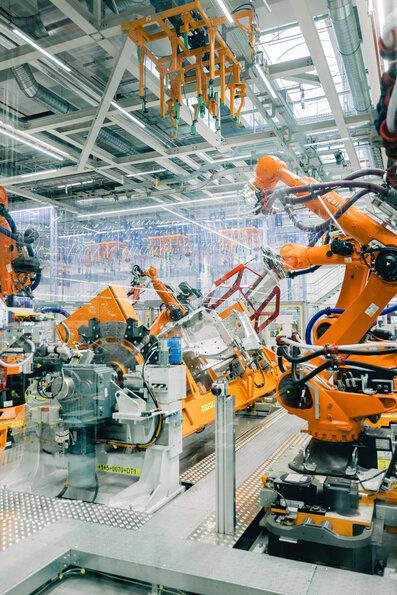
Crucial to the success of EC4P is the collaboration across four major technology partners. Siemens developed the virtual PLCs and the overarching automation strategy. Broadcom contributed the virtualisation software and the real-time capable industrial virtual switch.
Cisco extended its Software-Defined Access network infrastructure into the production environment, enabling seamless real-time data communication across the shopfloor.
“Together with our partners, we are realising the world’s first interaction between virtualisation platform, network and automation technology in automobile production,” said Pascal Schirmer, Planning Technology Development at Audi.
Audi’s use of a virtual industrial switch – a software component developed by Broadcom – ensures that real-time industrial communication protocols are supported, something traditionally only possible with dedicated physical networks. By integrating Cisco’s advanced network infrastructure, this architecture guarantees latency-sensitive control across a decentralised system.
Future scope and next deployments
With its pilot now proven at Böllinger Höfe, Audi is preparing to roll out EC4P and virtual PLCs at its Neckarsulm plant, beginning with the bodyshop for the new Audi A6. The intent is clear: to establish a standardised and replicable platform across Audi’s production network.
The strategic aim goes beyond cost-saving or reducing hardware. Audi envisions a software-defined factory, where production lines can be reconfigured quickly in response to market demand, product variation, or supply chain shifts. AI-driven production systems, computer vision and predictive analytics are now in scope as EC4P matures.
At a time where global production networks face ever tighter margins, regulatory scrutiny and sustainability pressures, Audi’s virtual shift offers a compelling blueprint for automotive manufacturers to boost efficiencies across their manufacturing ecosystems. Where production once relied on physical redundancies and rigid automation, it now moves toward a more abstracted, scalable and responsive production infrastructure.





























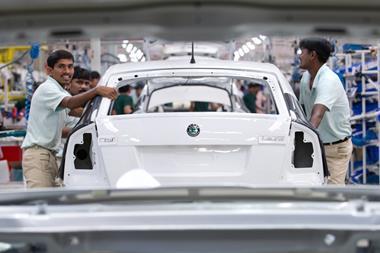
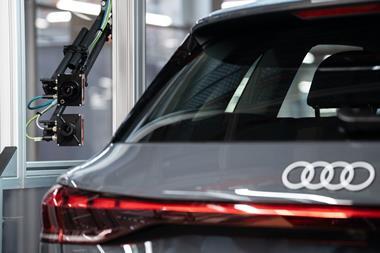
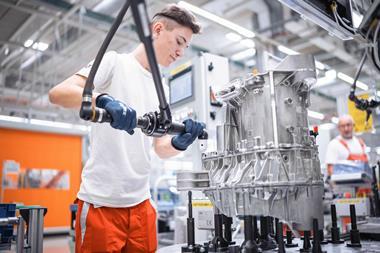
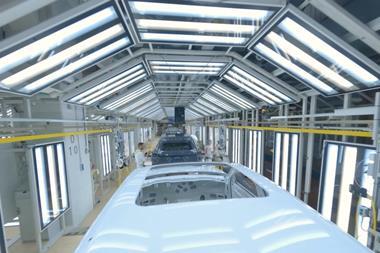

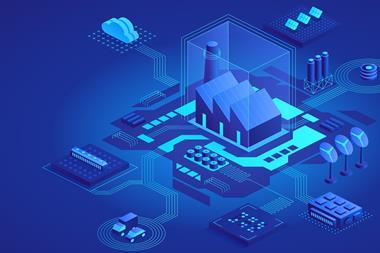



No comments yet